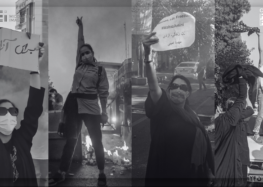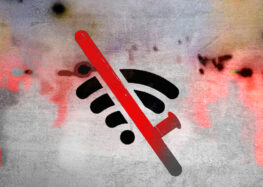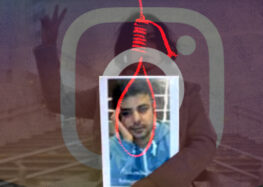The Rouhani Administration and Internet Freedom
While Hassan Rouhani campaigned for the presidency in Iran on a platform explicitly promoting Internet freedom, one year into his presidency there has been little progress to date on this front. In fact, as this report has shown, development of Iran’s National Internet continues, the filtering of mobile applications has increased, and the persecution of online activists and information technology professionals has intensified.
Rouhani’s policies have so far demonstrated that he is focused on pushing through his foreign policy objectives (namely, the P5+1 nuclear negotiations) and has thus been disinclined to simultaneously use his limited stock of political capital on domestic issues. Yet Rouhani has been more vocal on the issue of Internet freedom, even if his rhetoric has not translated into concrete policies, than he has on other domestic issues, in large part because Internet access (similar to the nuclear negotiations that will end the country’s international isolation) is integral to his overriding policy objective—the economic revitalization and modernization of the country.
Asked about Internet access in an interview with NBC on September 19, 2013, Rouhani said: “The government’s view is that the people should have access to all the information in the world.” Rouhani has also defended people’s access to social networks as a necessity. In the same interview, he said: “Networks have an important role. During my election campaign, I did not have a strong team but all my supporters, especially the youth, used these social networks. They still use them and in fact monitor the government’s work. I am happy that young people are so active and even check on the government’s actions.”
Other officials in his administration have also spoken in favor of people’s access to social networks. Minister of Islamic Guidance Ali Jannati told Fars news agency on November 15, 2013, “Facebook is a social network. I do not consider it a crime to use it. People have healthy and proper communications there. I myself have a presence in Facebook.” In May 2014, Telecommunications Minister Mahmoud Vaezi said “Only 15 percent of Facebook’s content consisted of unsuitable material and photos and the rest is beneficial and can easily be used and managed inside the country.” Indeed, in a tacit stamp of approval for these social networks, a number of senior government officials, including not only Rouhani but his foreign minister Javad Zarif and others as well, have joined the millions of Iranians who have active pages in their name on social networks such as Facebook and Twitter, even though the sites are officially blocked inside the country.
Moreover, Rouhani has, upon occasion, taken specific actions to advance Internet freedom. His order to unblock the mobile application WhatsApp, after the Working Committee had blocked it, was a rare instance of administration pushback against the hardliners. Yet while this case has been frequently cited as an indication that he wishes to advance Internet freedom in the country, it also revealed that Rouhani can—when he desires—wield his not insignificant powers to push back against hardliners’ efforts at increased censorship. This raises a fundamental question: namely, why Rouhani has not done more to promote Internet access?
To be sure, many argue that Rouhani has limited powers to address these issues. Khamenei and the various committees he has established to oversee the Internet, such as the Supreme Council and the Working Group, are dominated by hardliners who share Khamenei’s view of the Internet as an inherently hostile force. Administration members are a permanent minority on both bodies.
Moreover, Rouhani has faced withering criticism by hardliners for his statements supporting Internet freedom, for the presence of administration officials on social networks such as Facebook and Twitter and for their support of people’s access to it, and for the few actions he has taken to defend Internet access, such as the unblocking of WhatsApp. In a typical remark, the conservative leader of Friday Prayers for the city of Mashhad, Ayatollah Ahmad Alamolhoda, stated, “The Young Journalists Club has quoted the government’s Telecommunications Minister that the government should remove filters and unblock Facebook….That means we should open our gates to the enemies of Prophet Mohammad. Breaking the block on Facebook would bring nothing other than insults against the Prophet and his family. Our youth will be flooded with anti- religious material. Is this how you want to conduct cultural resistance?” Alamolhoda added, “Have the people voted for this government, this president and this Majlis [Parliament] to break the filter on Facebook? You say only 15 percent of Facebook is useable [sic]. Is that enough to break the filter and open the gate [to] the enemies of God?”
After months of pressure from hardliners to maintain blocks on various social networking sites and applications, Guidance Minister Ali Jannati pushed back, albeit gently, telling the Mehr news agency in July 2014, “The dispute today is over the details. One group believes that Viber should be filtered. Another group is against it. These differences also exist among the members of the Working Group to Determine Instances of Criminal Content on the Internet. But we should not act according to personal tastes. We should act according to the law.”
Defending the government’s hitherto inability to remove the block on Facebook despite the fact that many officials in the administration actively use the site, Jannati also called attention to the domination of key Committees by hardliners, stating in a meeting with Iranian digital professionals, “The filtering committee [i.e. the Working Group] is in charge of removing filters. It is not under the direct supervision of the [Islamic] Guidance and Culture Ministry. This [Guidance] ministry only has a representative in the committee. We have to speak with all members of the committee to make it legal to use Facebook and all other social networks.”
Nevertheless, it is also true that development of Iran’s National Internet is being led and implemented by the Ministry of Telecommunications, which is under the direct authority of the executive branch, and that this Ministry’s budget is allocated by the Rouhani administration. The Ministry of Culture and Islamic Guidance, which has assumed an increasing role in filtering sites (independent of the Supreme Council and the Working Group), is also under the direct authority of Rouhani, and receives its budget from the administration. In addition, Rouhani chairs the Supreme Cyberspace Council, and has attended its meetings since assuming the presidency, reflecting the importance he gives to Internet issues and the Council’s decisions regarding them. Thus Rouhani clearly has avenues of influence, as the WhatsApp incident revealed, and it remains an open question why he has not done more to defend and advance Internet freedom in the country.
Given Rouhani’s support for the continued implementation of the National Internet, it appears he will most assertively promote Internet access in so far as it advances the economic revitalization of the country— a goal that is central to his administration’s agenda. Thus he has consistently pushed for increasing the bandwidth available inside Iran, which is necessary for effective professional, commercial and academic use. On June 6, 2013, he stated, “The current Internet bandwidth [available] is not what the Iranian people deserve…. Today we live in a world of communication. Unfortunately, however, some people think they are living in the 19th century.” On May 17, 2014, he publicly expressed dissatisfaction with Iran’s 154th global ranking in terms of bandwidth capacity, saying, “The Telecommunications Ministry plans to implement third and fourth generation technologies as soon as possible, bringing broadband not only to homes and businesses, but also for mobile devices.”
Rouhani achieved significant progress in increasing bandwidth in September 2014, when the Ministry of Communications opened up licenses to provide 3G and 4G mobile services in the country. Previously, there had been only one mobile provider, RighTel, allowed to provide 3G services. With RighTel’s reported 1.5 million customers, this represented a relatively small percentage of the almost 57 million mobile phone users inside Iran as of 2013.
The opening up of 3G and 4G licenses represented a victory against hardliners, who railed against fast Internet speeds (and the access to content such speeds would allow) and had long relied on the practice of slowing down Internet speeds to the point where its use was rendered effectively impossible. In August 2014, Ayatollah Nasser Makarem Shirazi, one of the country’s highest clerical authorities, issued a fatwa that stated, “All third generation [3G] and high-speed Internet services, prior to realization of the required conditions for the National Information Network, is against Sharia [and] against moral and human standards.”

A poster on Ayatollah Khamenei’s Facebook page promoting his social media accounts. The same social networks are officially blocked for Iranian citizens.
Yet the administration pressed forward and has so far succeeded in this initiative. In a direct rebuttal on September 1, 2014, Rouhani said, “We cannot shut the gates of the world to our young generation…. Once, there was a time that someone would hide his radio at home, if he had one, to use it just for listening to the news. We have passed that era.”
In addition to focusing on upgrading the technological infrastructure, Rouhani has promoted Iran’s international engagement on information technology issues. Iran has resumed high-level participation in the World Summit on the Information Society (after a scant presence during the 2005-2013 Ahmadinejad administration, when there was little interest in an organization where countries make proposals to “establish the foundations for an Information Society for all”), and his administration has facilitated the attendance of Iranian experts, academics, and journalists in the summit. During the last summit, Iran’s Telecommunications Minister invited the secretary general of the International Telecommunication Union to visit Iran. In addition, the Telecommunications Ministry recently issued a tender for “Tadbir 1,” the project to upgrade and expand the country’s Internet infrastructure, and reports suggest that the Rouhani government is trying to bring Western companies into the project.
The Rouhani administration’s willingness to be more engaged with the international community, especially through its participation in UN forums, international organizations, and international information communication technology (ICT) conferences (such as the International Telecommunication Union (ITU), the Internet Corporation for Assigned Names and Numbers (ICANN), the World Summit on the Information Society (WSIS), and the Internet Governance Forum (IGF), presents an opportunity for civil society in Iran to participate professionally and present a credible voice on Internet freedom issues in a multi-stakeholder process. This process will help promote Iranian officials’ accountability regarding their international obligations on UN principles and Internet governance. Civil society must remain vigilant, however, that the Iranian government does not use its participation in these conferences and other forums to obscure its crackdown on cyberspace.
Overall, the Iranian state seems to have a conflicted relationship towards the Internet—embracing it when it advances a desired agenda, controlling it when it challenges that agenda. The quintessential example of this is Khamenei, who promotes anti-Internet policies and yet has accounts in nearly all officially banned social networks, such as Facebook, Twitter and Instagram, in Persian, English, and Arabic. Khamenei, as almost all other Iranian officials, hardliners and moderates alike, recognizes that the Internet has become an indispensable tool for reaching the public. Thus, for example, hardliners cheered on the wave of remarks on Twitter, YouTube, and other social networks by Iranian citizens that ridiculed Israeli Prime Minister Benjamin Netanyahu for his inaccurate remarks about Iranians not being able to wear jeans. Reflecting an increasingly contradictory relationship with social media, expression on such sites is acceptable, but only if the party line is followed.
Advocates of Internet freedom, both inside and outside Iran, hope that Rouhani will use all of his authority and powers to promote Iranians’ full and safe access to the Internet, in the same way that he has successfully promoted mobile infrastructure upgrades such as increased bandwidth through the provision of 3G and 4G services.






